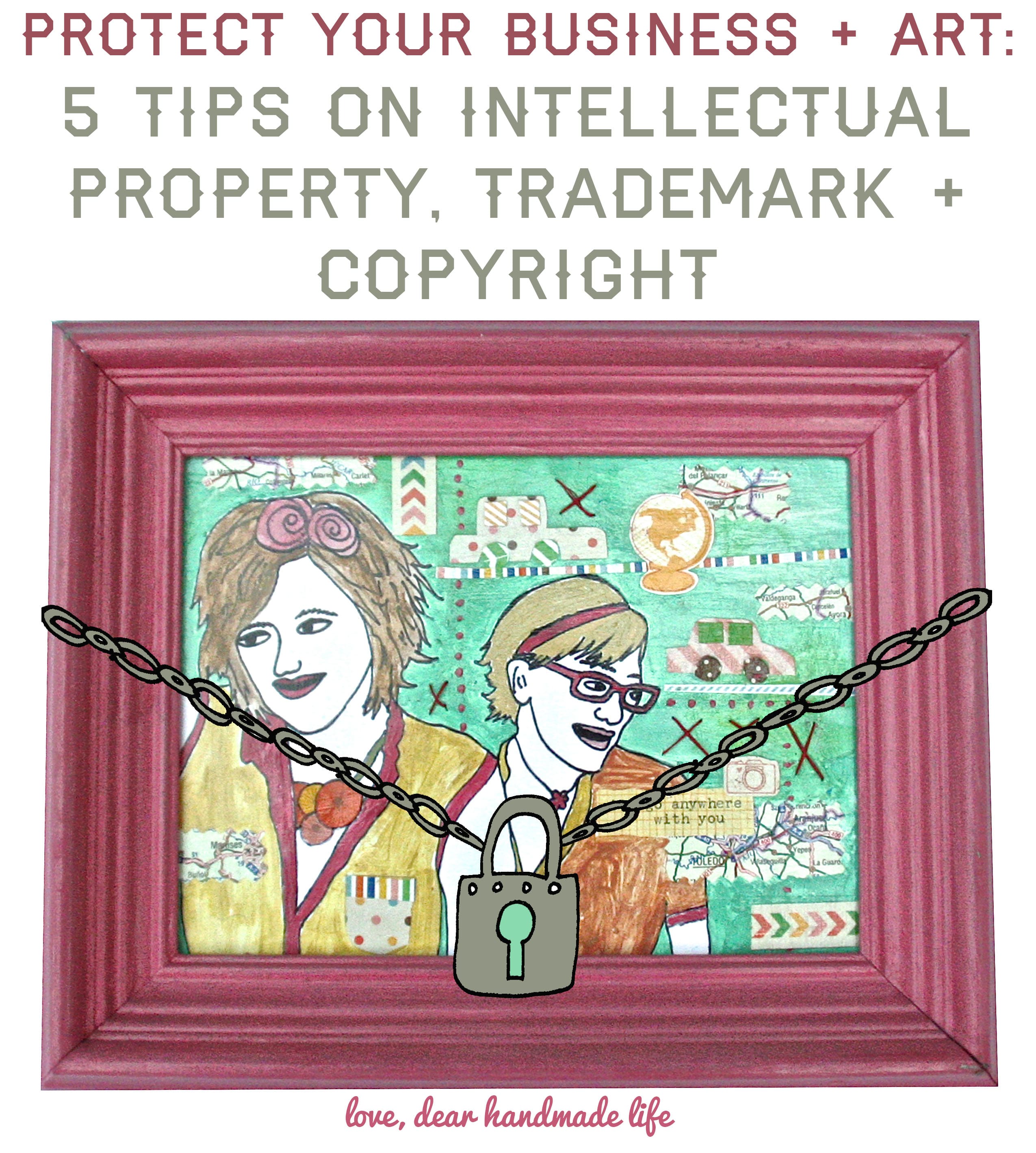protect your business: tips on intellectual property, trademark + copyright
*Editor’s note from Nicole:
When I started my first ‘real’ (not the refrigerator box stationary shop on my front lawn when I was six) business Random Nicole, I didn’t even have money to buy the fabric to make my purses. So, I intercepted my friend’s jeans on their way to the salvation army donation box. I cut the denim into squares, sewed them together and set-up shop at the Hollywood + Fairfax flea market with my line of upcycled hand-bags. Those first days (let’s be honest, years, actually) were pretty rough. I ate a lot of canned tuna on toast, slept on a beanbag and had a car that went only slightly faster than a bicycle. Talking to a lawyer about protecting my company’s name or my designs wasn’t on my mind. I was too busy trying to figure out how to have enough money for my own room (preferably one with an actual bed and dare I dream…a closet).
Back then, I had no idea that Random Nicole would turn into my full-time job for the next decade! Not only did I end up with my own room, but at one point I had actual assistants, helpers and a studio. Hundreds of stores all over the world carried my line of clothing, purses and accessories. I had five reps showing my goods to potential buyers at trade shows. Things were awesome!
Then one day, a friend called to congratulate me on designing for “insert big huge brand name children’s wear designer” (I don’t want to name names here) and having my stuff sold at Costco! Whhhaaaattttt???!!!! Turns out this big ol’ brand name had copied one of my drawings and added embellishments around it in, you guessed it… the exact same places I had them on the shirt in my line. I consulted a lawyer. The first things he asked me: have you trademarked your name/branding? Or copyrighted your artwork? Sadly, I hadn’t. Fighting the big brand name would have taken money and precious time away from business, so I didn’t pursue legal action. I tried to think of it as a compliment and moved on.
Issues of intellectual property and copyright have been popping up a lot this year and while I don’t want to get into specific cases here, I would however like to offer a little help from Craftcation speaker and intellectual property attorney Annie Tunheim. Annie loves working with creative businesses and has sweetly shared some tips below.
-nicole s.
Thoughts on intellectual property and the small business from Annie Tunheim:
If your business is but a wee fledgling just acclimating to its surroundings or a confident bird who has already left its nest bound for brighter horizons, you have undoubtedly heard about the need to handle your intellectual property.
As a solo practitioner intellectual property attorney, my job allows me to live vicariously through my amazing clients who are all over the United States. I work with people that create everything from cheese-making kits to herbal soaps to letterpress cards to boutique cat toys and more. It’s a symbiotic relationship; I get a glimpse of, as well as inspired by, their creativity, and I help them navigate through the various legal paths to make sure that the brand they are building is distinctive and will have longevity in today’s global market.
Common small business IP (Intellectual Property) assumptions/pitfalls:
*I don’t need to have a registered trademark. My business is so small; who is going to copy little ol’ me?
Businesses start out small but may become larger than you ever imagined. One of my clients moved to the United States from Australia. She had her first child in the US and found herself longing for the muslin blankets that are ubiquitous in her home country. So, she launched a line of her own. Now her tiny business is a leading international brand in infant and children’s products. guess whose blanket prince George (the royal baby) was swaddled in for his first photo? That’s right, my client’s! Five years ago, my client never would have predicted her brand’s international reach and popularity. It would be devastating to spend years investing in a brand only to find that the mark you have been using isn’t protectable, or worse, that it is infringing upon someone else’s mark. The ideal time to address intellectual property is at the start of your business, or best case scenario, while the brand is still in development.
Also, many businesses expand their reach by entering into agreements with distributors/large retailers. Oftentimes, these larger companies will require/strongly suggest that your intellectual property is in order before agreeing to sell your products. When an opportunity arises, you don’t want to be held up by backpedaling and taking care of IP issues in order to move forward.
*This process will be too expensive for my business; I simply don’t have the cash flow.
There are different kinds of intellectual property—without going into too much detail, there are patents (which protect a product design or process of manufacture), copyrights (which protect an original work of art/music/film/writing) and trademarks (which protect a word, phrase or symbol that indicates the source of goods). While the patent process does cost quite a bit of money, addressing copyright and trademark needs are relatively inexpensive. While an initial outset of cost, it is minimal when taking the five-year view. Less than the cost of a monthly manicure, or a couple glasses of wine while out with friends. Since the majority of my clients are small business owners, some solo practitioners (including me) I use flat-fee pricing and readily agree to flexible payments to make the process feasible for any size business. This practice is becoming more common, especially if you stay away from the larger, downtown firms.
*I named my business by blending my childhood hamster’s name with my husband’s favorite color and threw in another two made-up syllables. I don’t need to have a registered trademark; no one will use this mark!
You’d be surprised how many accidental infringement cases arise! It is always unfortunate when two small business owners in separate areas of the country begin increasing their reach and become aware of each other. Neither wants to rebrand, and who has intellectual property rights to which region becomes far more cumbersome when neither party has federal trademark rights.
Questions to consider or discuss with your attorney before moving ahead with an IP strategy:
-what are the most important products to your business (i.e. your flagship items)?
-what do you see your product line/service offerings including five years from now?
-do you have (or want) a graphic element or visually distinctive way or presenting your brand?
What are your sales goals (currently and looking ahead five years from now). i.e. do you want to remain in local farmer’s markets or do you wish to become a national/international brand?
Answers to these questions will help inform your decision about what you have that is worth protecting and how you may create a long-term strategy for further IP protection.
What you can do right now to begin protecting your intellectual property:
If you have never thought about the letters I and P together, all is not lost. While you mull over the questions above, you can do these things right now:
*Put a small TM after your brand name (on your website, labels, marketing materials, etc.) to show you are claiming common law rights to the mark. Simply by using the mark, you are building rights to the mark in the geographic areas that you’re using it. You want to have others notice that you are aware of intellectual property and noting your rights.
*set a Google Alert for your mark and keep an eye out for internet usage that may be uncomfortably close to yours.
-annie
The information contained herein is for informational purposes only and should not be construed as legal advice, nor is this blog post intended to create an attorney-client relationship. Legal advice must be tailored to the specific circumstances of each matter; if you are interested in seeking assistance with intellectual property matters, feel free to contact Annie at www.annietunheim.com or email at info@annietunheim.com.
About Annie:
Annie Tunheim is an intellectual property attorney who opened her virtual law practice Tunheim Law LLC in 2008. She counsels business owners throughout the United States on how to create and maintain strong brands both domestically and abroad. An attorney by mind but a lover of all things handmade at heart, she can often be found in the kitchen whipping up healthful baked goods for her three hungry boys, crocheting, or crafting a plan to rope her husband into joining her for the next DIY home improvement project. She has lectured at the International Bar Association Conference, her virtual law practice has been featured on Forbes.com, and she has extensive experience with clients in the clothing, arts and craft, jewelry, bath and beauty, and home goods industries. Some of her clients include Holly Becker from the preeminent design blog decor8, aden + anais (world-renowned for their muslin baby products), and Couch (guitar straps for some of the music industry’s greats). She lives in a hundred-year old home in Denver, Colorado and spends much of her free time hiking and enjoying the outdoors with her visual arts teacher husband, children, and dog.




Thanks for posting this advice for businesses to protect their intellectual property. It’s interesting that businesses can put a small TM after their brand name to show that they claim common law rights to the mark. That seems like a really simple way to protect websites, labels, and marketing materials for companies.
Wonderful article. Thank you for your advice and experience!